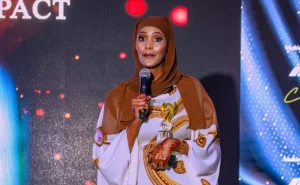Kenyan genge pioneer Hubert Mbuku Nakitare, popularly known as Nonini, is once again in the spotlight—this time not for acclaim, but for intense criticism following the promoted release of his latest album.
The veteran rapper, famous for classics such as “Manzi wa Nairobi” and “Wee Kamu,” has become a trending topic on social media, with fans and critics alike voicing their profound disappointment over what many describe as a stark departure from his iconic sound.
The backlash began almost immediately after Nonini teased the album, initially sparking widespread excitement among loyal fans who hoped for a nostalgic return to his foundational genge roots.
Instead, listeners were met with a sound they largely found underwhelming—prompting widespread online mockery and a fierce debate over the rapper’s current musical direction and continued relevance in the evolving Kenyan music scene.
“Grandpa Trying to Rap”: Critics Unsparing in Their Disappointment
Critics have not held back in their assessment of the new project. One post lamented, “Nonini’s new album is a disaster. Where’s the genge we loved? This is just noise,” while another pointedly remarked, “Teased us with ‘last song’ vibes and delivered this? Nonini, you’re washed up.”
The general consensus among disappointed fans is that the rapper’s attempt to evolve his sound has unfortunately fallen flat, failing to meet expectations.
Some even went as far as comparing the audio quality to “bathroom recordings” and derisively called the project “grandpa trying to rap” energy.
A more nostalgic group of fans expressed their frustration in sorrowful tones, reflecting on the perceived gap between Nonini’s golden days and his present musical output.
“Manzi wa Nairobi was gold. This new album? Not even bronze,” one fan quipped, highlighting the perceived drop in quality.
Another added, “Grew up on Nonini’s classics, but this new drop is a skip. Sad day for genge fans,” conveying a sense of profound disappointment.
Though overwhelmingly outnumbered by the backlash, a few loyalists have stepped up to defend the veteran artist.
Some pointed out that musical growth and experimentation should be allowed, even encouraged. “Give Nonini a break, he’s trying something new. Not every album can be a hit,” one supporter urged, calling for understanding.
Another noted, “People hating on Nonini’s new album are just stuck in the past. It’s different, not bad,” advocating for open-mindedness towards artistic evolution.

A Referendum on Legacy
Still, the negative sentiment appears to dominate the online conversation. His career-defining albums Hanyaring Game (2004) and Mwisho Ya Mawazo (2007) remain undisputed high points in his discography, as consistently noted in public records and music databases.
However, the sharp contrast between the critical acclaim of those earlier projects and the current fierce negative reception of his latest release has raised significant questions about the sustainability and relevance of legacy acts in Kenya’s rapidly evolving and increasingly competitive music scene.
As of now, Nonini has yet to issue a statement directly addressing the widespread criticism. Meanwhile, the social media storm shows no signs of slowing, with his latest work effectively turning into a public referendum on his storied legacy.
by Geoffrey mbuthia












